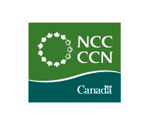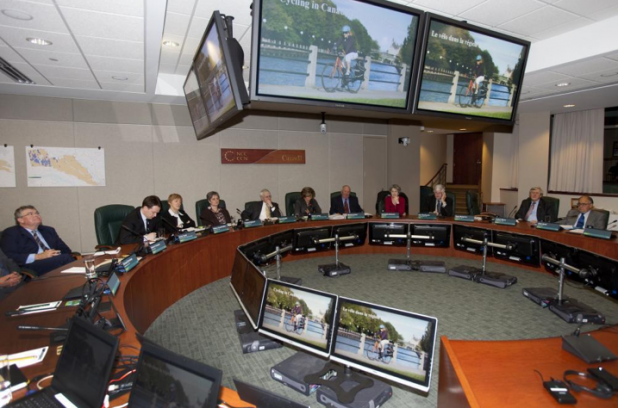 The National Capital Commission (NCC; home page at https://ncc-ccn.gc.ca/) is a Canadian Federal Government crown corporation with a mandate to, in their own words:
The National Capital Commission (NCC; home page at https://ncc-ccn.gc.ca/) is a Canadian Federal Government crown corporation with a mandate to, in their own words:
plan and assist in the development, conservation and improvement of the National Capital Region in keeping with its significance as the seat of the Government of Canada. The NCC also organizes sponsorship and promotion of public activities and events that enrich the cultural and social fabric of Canada, and foster cooperation among organizations with a stake in Canada's Capital development.
Nice, eh? In practise, this has meant decades of bad urban planning and shady land development schemes, undertaken in a shroud of secrecy and with total disregard for Ottawa's residents.
The National Capital Commission is actually the third in a line of commissions responsible for "beautifying" Canada's capital, Ottawa. The original Ottawa Improvement Commission had a budget of $60000. The NCC's parliamentary appropriations in 2002-2003 were $125 million.
The NCC is the largest land owner in the region. Their target for revenues from land disposal in the period 2000-2005 was $6 million per year. Actual revenues from land disposal for 2000-2001 was $19 million. Their target revenue from development for the period 2000-2005 was $8 million. Revenues from property leases for 2000-2001 were $12 million. Meanwhile, they ask for donations to run the Rideau Canal Skateway. The NCC has around 500 employees.
The NCC's corporate mission is embodied in three central themes: Canada's Capital Region is to be a national meeting place, a common ground where Canadians can express their aspirations, appreciate diversity and celebrate those qualities that make this country unique; the Capital must communicate Canada to Canadians, as well as to visitors from around the world, promoting enthusiasm and understanding for this country, while showcasing Canada's past, present and future; and the Commission aspires to safeguard the Capital's national treasures, the numerous sites of great prestige and public interest that are held in trust for future generations of Canadians.
NCC's old mission statement
Centretown News: History of the NCC [17 Mar 2000]
Capital News Online: Capital Conflict [4 Feb 2000]
The Chairman
The Chairman of the Board is Russell Mills, appointed in April 2007 for a five year term, and reappointed in Apr 2012. The position is part time, as the board only meets several times a year. The role of the Chairman and the board is to provide oversight of the operations of the NCC. Prior to the Mills appointment, the Chairman was also the CEO, but somebody finally figured out that a Chairman providing oversight over himself was no oversight at all.
The previous Chairman of the Board and CEO, Marcel Beaudry, a former mayor of Hull and independently wealthy developer and businessman, was appointed for a seven year term in 1991 and reappointed for another seven years in 1998. His salary was $196,300, raised from $181,700 on Feb. 16, 2001, with an unusual retroactive provision extending back to April 1, 2000; he also had a chauffeur-driven government limo and all the other perks of a deputy minister. According to a November 5, 1994 article in the Citizen, Canadians taxpayers paid almost $10,000 to provide Beaudry with memberships to some of the most exclusive -- and expensive -- social clubs in the Ottawa area, including:
- Le Cercle Universitaire. Cost in 1994: $3,573 -- a $1,605 initiation fee, and two annual renewals of $984 each.
- The Rideau Club. Posh dining and drinking for Ottawa's elite. Cost in 1994: $1,610.
- The Country Club Champetre in Aylmer. Cost in 1994: $3,970 -- a $1,500 initiation fee, plus two annual renewals totalling $2,470.
The previous chair, Jean Pigott, paid for her own club memberships.
The Board
The NCC board of directors has 15 members: five from the capital, eight from other parts of Canada, and the chair and vice-chair. All members are appointed and their purpose is largely ornamental.

This thing is great but does it get HBO?
Board meetings were formerly held in private, and the NCC fought tooth and nail to keep them that way until finally succumbing to reality after the Mandate Review of 2006. Meetings are now public, with the exception of special in camera sessions for business they consider to be private.
Citizen: NCC Board members respond to calls for openness [24 Aug 1998]
Citizen: NCC behind closed doors [24 Aug 1998]
Citizen: What the NCC views as secret [3 Feb 2000]
Doesn't the NCC do a lot of good things?
As we hope these pages illustrate, the bad outweighs the good, and the good is largely accidental. And there's nothing that the NCC does that can't be done by someone else. The NCC's current responsibilities should be split up as follows:
- Gatineau Park, Rideau Canal and other historic properties, with their attendant budget, should be taken over by Parks Canada and/or the Department of Canadian Heritage.
- Planning, development and tourism is already done by the Cities of Ottawa and Gatineau.
- Federal Government buildings and lands can be maintained by the Department of Public Works.
- The Greenbelt and various other NCC-owned properties (including the LeBreton Flats and the Daly site) should be handed over to the respective municipal governments.
All of these organizations, whether federal departments or municipal governments would provide better accountability and more transparent operation than the NCC.
What about the NCC's mission to build a Capital for all Canadians, and safeguard sites of national interest?
As the NCC never fails to mention when anyone opposes one of their plans, they claim to serve a broader mandate than the townsfolk who are in charge of the sewers and picking up the trash. It's a convenient excuse they use to justify everything they do, while dismissing any criticism as small-minded parochialism. But it's an empty one:
- Claiming to do something for all Canadians doesn't make it either the right thing to do, or make it for all Canadians - projects and plans must be judged on their merit, and all too often the NCC's projects and plans are failures.
- The country is chock full of sites of national interest that don't require a Crown corporation to safeguard them or inform us of their significance.
- The NCC decides what are and what aren't sites of national significance, and does so in secret. And quite often they change their minds. Land that was expropriated as a national treasure one year is sold as surplus land or developed 20 years later. And no one but the NCC knows the criteria by which these lands are declared surplus, or by which they were acquired in the first place.
- Nobody has a bigger stake in Canada's Capital development than the people who live there.
So they do what they do for all Canadians - they've still done a lousy job.
What about the NCC's mission to foster PRIDE and UNITY?
In the late seventies, there was talk of doing away with the NCC, considering that their job, such as it was, was largely done - the Greber Plan was implemented, and everything that needed (or at least they were likely to get away with) demolishing was demolished. So the NCC cooked up this mission in response. Self-promotion, marketing and "animating the capital" eventually took up $17 million of their budget. Well, assuming such activity was actually required, which we consider to be a bit of a stretch, how do strictly local matters like widening the Champlain Bridge and building highways foster anything but indifference, or possibly irritation among Canadians who don't live in the region? Considering the ministry of Canadian Heritage, for one, was already promoting Canada to Canadians at great expense, this amounted to little more than a particularly feeble justification for the NCC's already overlarge budget.
Evidently, someone agreed with us, as in March 2013, all of the NCC's public programming and promotional activities, along with the attendant staff, was transferred to Canadian Heritage, leaving the NCC with managing its properties and, in its way, planning the Capital.
Citizen: Department of Canadian Heritage to assume some National Capital Commission duties [22 Mar 2013]
Citizen: National Capital Commission seeks help to cope with change [16 January 2014]
Aren't you just being negative for the sake of it?
Maybe, but we're not making this stuff up. The information on NCC Watch is distilled from very real news reports. If you want another point of view, the NCC are shameless self promoters and have a large, patronizing, and relentlessly pro-NCC site to prove it. At least we link to them; to our knowledge, they have yet to return the courtesy.